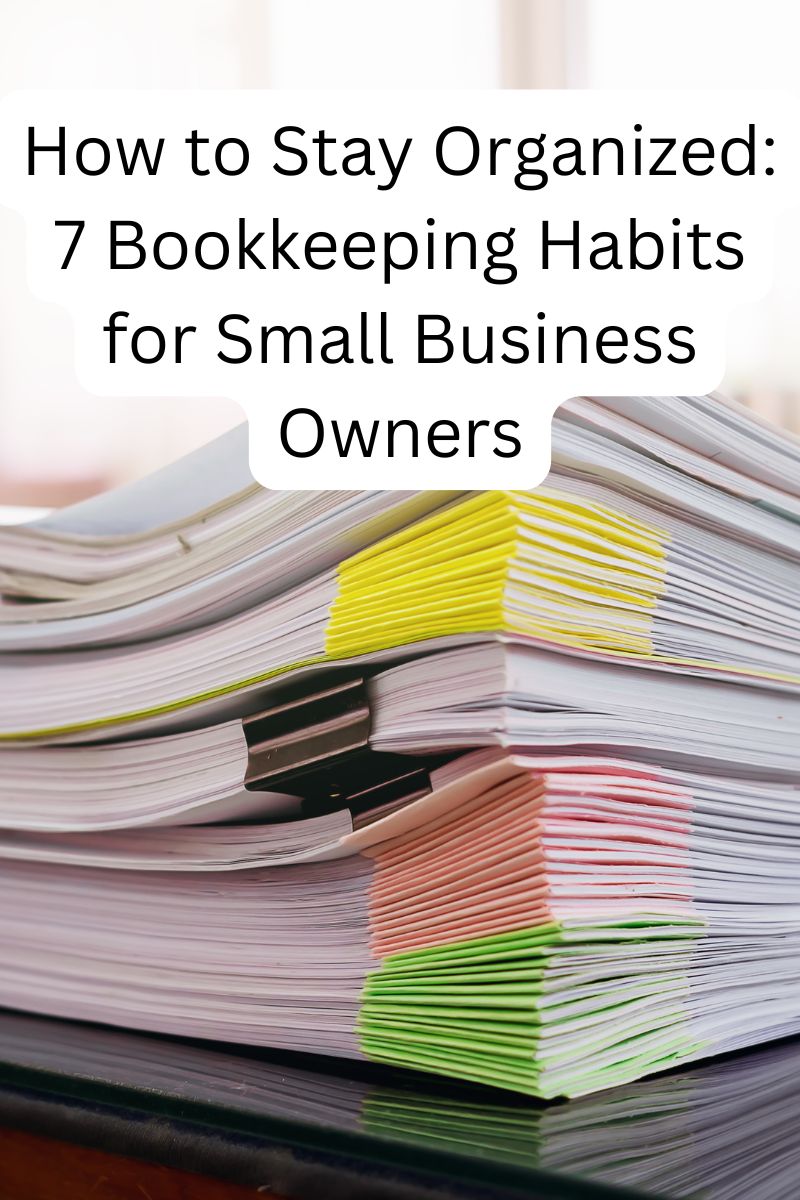Running a small business is exciting, but keeping your finances organized can often feel overwhelming. Bookkeeping is one of those tasks that can quickly pile up, leaving you stressed during tax season or scrambling to find missing numbers.
The good news? Staying organized doesn’t require hours of work—it’s all about building simple habits that keep your books in shape and your business on track. Here are 7 bookkeeping habits every small business owner should adopt to stay organized, save time, and reduce stress.
1. Schedule Weekly “Money Dates” 📅
Consistency is key to staying on top of your books. Set aside a specific time each week (I call it a “money date”) to review and update your finances.
What to Do During Your Money Date:
- Review income and expenses for the week.
- Reconcile your accounts with your bank statements.
- File any receipts or invoices.
💡 Pro Tip: Treat it like an appointment—put it on your calendar and stick to it. Consistency now will save you hours later!
2. Digitize and File Your Receipts Immediately 🧾
Paper receipts can be easily lost, crumpled, or forgotten. Adopting a habit of digitizing receipts as soon as you get them will help you stay organized and ready for tax season.
How to Do It:
- Use apps like Dext, Expensify, or QuickBooks to snap photos of receipts and file them digitally.
- Create folders (organized by month or category) on a cloud platform like Google Drive or Dropbox.
💡 Pro Tip: Train yourself to take a picture of a receipt right at the point of purchase. It takes seconds but saves hours of searching later!
3. Reconcile Your Bank and Credit Card Statements Monthly ✅
Reconciliation sounds intimidating, but it’s simply the process of making sure your financial records match your bank statements. Doing this monthly will help you spot errors, missing transactions, or even fraudulent activity.
Steps to Reconcile:
- Compare your bank or credit card statements with your bookkeeping software.
- Check for duplicate entries, errors, or missed transactions.
- Correct any discrepancies right away.
💡 Pro Tip: Use software like QuickBooks Online or Xero, which automatically syncs your bank transactions to make reconciliation faster.
4. Invoice Promptly and Follow Up on Payments 💼
Cash flow is the lifeblood of your business. If you delay sending invoices or forget to follow up on unpaid ones, it can hurt your cash flow and growth.
Good Habits to Adopt:
- Send invoices as soon as work is completed or products are delivered.
- Set up automated reminders for overdue payments (most bookkeeping software can do this for you).
- Follow up politely but firmly to get paid on time.
💡 Pro Tip: Make it easy for clients to pay you by offering multiple payment options like credit cards or bank transfers.
5. Separate Business and Personal Finances 💳
Mixing personal and business expenses is one of the most common bookkeeping mistakes small business owners make. It creates confusion, makes tax prep a nightmare, and could even cause compliance issues.
How to Fix It:
- Open a dedicated business bank account and credit card.
- Use these accounts exclusively for business income and expenses.
- Avoid paying for personal items with your business funds (and vice versa).
💡 Pro Tip: If you accidentally mix expenses, flag them immediately and correct them during your weekly money date.
6. Monitor Cash Flow Regularly 💰
Knowing how much money is coming in and going out is critical to keeping your business healthy. Regularly reviewing your cash flow helps you plan ahead and avoid unexpected shortfalls.
How to Stay on Top of Cash Flow:
- Check your income and expenses weekly.
- Forecast future cash flow for the next 30-90 days.
- Plan for upcoming expenses like payroll, taxes, or inventory.
💡 Pro Tip: Use tools like Float or cash flow reports in your bookkeeping software to get real-time insights.
7. Review Financial Reports Monthly 📊
Financial reports tell the story of your business’s health. By reviewing reports like your Profit & Loss (P&L) and Cash Flow Statement each month, you’ll gain valuable insights into your business performance.
What to Look For:
- Are expenses increasing in certain areas?
- Which products or services are driving the most profit?
- Do you need to cut costs or increase sales?
💡 Pro Tip: Reviewing these reports regularly helps you make smarter decisions about where to invest time, energy, and money in your business.
The Benefits of Staying Organized
By adopting these 7 habits, you’ll:
✅ Save time and avoid scrambling during tax season.
✅ Have a clear understanding of your cash flow and profitability.
✅ Reduce stress and eliminate surprises in your finances.
✅ Free up time to focus on growing your business.
Remember, the key to staying organized is consistency. Small habits, when done regularly, add up to big results over time!
Need Help Staying Organized? I’ve Got You Covered! 💼
If keeping up with your books feels like a constant struggle, you don’t have to do it alone. As a professional bookkeeper, I can:
- Keep your books organized and up-to-date.
- Provide detailed financial reports to help you make better decisions.
- Save you time so you can focus on growing your business.
📅 Schedule a free consultation today, and let’s get your books in shape!
[Book My Free Call]
Conclusion:
Building good bookkeeping habits doesn’t have to be complicated. By scheduling regular check-ins, digitizing receipts, reconciling accounts, and reviewing your financial reports, you’ll stay organized and in control of your business finances. Start small, stay consistent, and watch your stress disappear as your financial confidence grows!
